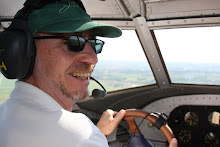
Friday, December 5, 2008
Like a blog needs a bicycle
We are a week away from the start of the ASCB Annual Meeting in SF for which I am supposed to produce a Cell Bio Blog. I've been wondering if I could volunteer for root canal work instead. I've never blogged and the very idea of it is unnerving. Where do I begin? Where does it all end?
This morning, the NY Times reports the death of "HM," the legendary amnesiac studied for decades by Canadian psychologist Brenda Milner. HM, whose name the Times now reveals was Henry Moliason, died in a Connecticut nursing home on Tuesday night, aged 82. HM sustained brain trauma in a childhood bicycle accident. By the time he was in his mid-20s, HM was having blackouts and uncontrolled convulsions. Unable to work, HM sought out surgical help for these debilitating seizures. This was in the early 1950s. The neurosurgeon decided to ablate two narrow strips on the underside of his brain, transversing HM's hippocampus. It left him with a working memory about 30 seconds long. After that, everything and everyone was new to HM. The operation wasn't quackery. It reflected our primitive knowledge of how the brain was organized and how it functioned 60 years ago. Today the idea that any reputable surgeon would cut into the hippocampus is shocking. We know so much more, right?
But to get back to HM: from his misfortune, Dr. Milner was able to lay the basis for the modern study of memory. In those pre-MRI days, Dr. Milner used simple games and tests to probe the shape of HM's radically reordered mind. From her studies, she derived the notion of two kinds of memory. There is declarative memory by which we record names, faces, and new events and there is motor learning by which we learn new physical skills like shooting a basketball or riding a bike. Under Milner's watchful eye, HM was able to acquire new physical motor skills. He learned to retrace a pattern on paper while looking at his hand's movement only in a mirror. This is a difficult skill and HM got better and better at it every time he sat down to try it. Yet he had no memory of the test. The skill struck him as completely novel every time he attempted it. He had no declarative memory of the task and yet his motor learning grew sharper and sharper. In fact, HM had no declarative memory of Dr. Milner. Thirty seconds after she left the room, she vanished. Every time she returned, Dr. Milner was a novel face to HM.
So how does this apply to blogging? I've never blogged. Yet I've been writing on paper and on screens for decades, most recently as the Science Writer for the ASCB. So will blogging be a declarative experience or will I just pop up the kickstand and peddle away? You are invited to watch me. I might wobble off to destruction or slip quickly into old habits on a new machine as I blog from the 48th Annual Meeting of the American Society for Cell Biology. I find ASCB meetings to be equally enthralling and mind flattening. So much exciting new science, so many boring PPT slides. The idea of this blog is to point out some of the former and skip the later.
I must also confess that my perspective at these meetings is different from that of the scientist members of the ASCB. I'm a science writer and not a scientist. I go to a different meeting as it were. Hopefully, you can ride along with me.
Meantime, I've got on my bicycle helmet, my pants clips, and my day-glow safety vest. SF or bust. One convention center, 6,000 cell biologists, and one brand new blogger.

2 comments:
Never fear. Blogging is a modern effort at building a community around thoughtful commentary and those 6000 cell biologists definitely represent a potential community of thoughtful commentators. I've only been attending ASCB meetings for about 12 years, but one thing I've noticed is that commentary is moving inexorably from the meeting rooms to the hallways and especially to the posters. Consider this question: What is the difference between asking a question at a microphone in a room of 200 people and asking the same question in a hallway or at a poster? I once surveyed a group of senior scientists asking, "What is the purpose of asking a question after a talk at a platform session?" Most said asking tough questions can only get you in trouble. One said he sits as far from the microphone as possible so he won't be tempted. Another said, I only go to poster sessions. I think the poster sessions are where the real scientific exchange and the real community-building are happening. Wouldn't it be interesting to run a poster session involving the senior scientists who might otherwise be presenting at a minisymposium? My guess is that a lot more people would get their questions answered and the presenters would get more out of their talks than mere prestige. Poster sessions are a blogger's dream.
Great initiative! I'm attending!
Post a Comment